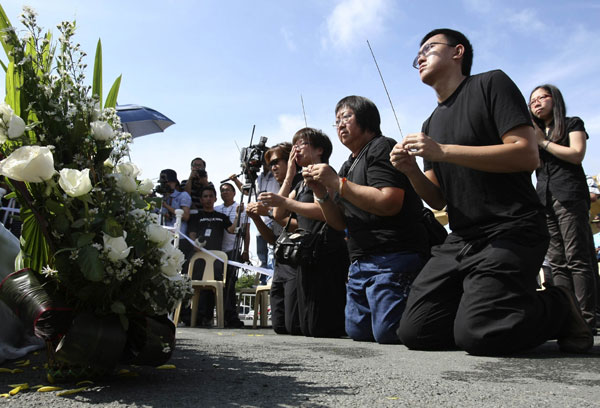Aquino’s convoluted non-apology

Relatives and a survivor in the botched bus hostage drama in Manila last year, hold incense during a Buddhist ceremony to mark the first anniversary at the Quirino Grandstand on August 23. AP
SAN FRANCISCO—Certainly, the basic rule is that you don’t say sorry if you didn’t do anything wrong.
But when it comes to an unfortunate incident that turned into a tragedy partly because of you, what’s so hard about saying something like this?
“A year after the tragedy, we are still deeply sorry for your loss, and we apologize for the apparent errors and miscalculations in the way our law enforcers tried to save your loved ones.”
In a sad twist to the saga of the Luneta massacre, P-Noy has come up with a convoluted concept of apology, one which became even more garbled in the way members of his team tried to explain his government’s position.
So what was supposed to be a solemn occasion to reflect on what happened a year ago turned into another public relations fiasco.
Article continues after this advertisementIt begins with the victims’ families requesting an official apology to which spokesman Edwin Lacierda, according to news reports, responded that the government has already repeatedly apologized.
Article continues after this advertisement“How often does one have to apologize?” he was quoted as saying in an Associated Press report.
But wait. It seems as if the spokesman misspoke.
For it as it turns out, contrary to the spokesman’s complaint, Team Noynoy never apologized, and apology certainly is not on the agenda.
Here’s Secretary Leila De Lima insisting that an apology would be “too much.” Regrets, yes, but an apology, definitely not.
This was followed by Secretary Jesse Robredo’s odd argument about apology being “mere words,” before P-Noy himself weighed in with undoubtedly one of his most unpresidential statements.
“Giving an apology connotes that the state did them grievous harm,” he was quoted as saying. ”I don’t think that is correct. This was the act of one man. In the same token that some of our citizens have been affected elsewhere in the world, we do not blame the entire population.”
Huh?
Was there something lost in the translation in the message conveyed by the Luneta victims’ families from Hong Kong?
Did they really accuse the entire Filipino people of directly doing them “grievous harm,” and were demanding that the entire Filipino nation apologize for the tragedy?
If that’s the case, why, yes, that’s outrageous that anyone would make such a request.
But obviously, the grieving families of the victims were not that unreasonable. Isn’t it obvious that the ‘apology’ being requested referred specifically to Team Noynoy’s disastrous mishandling of the rescue?
Is there even any question that the way the government handled the operation was a disaster? Is there even a debate that the so-called rescue was a bungled operation?
After all, even P-Noy’s own government came out with a report criticizing the rescue — a report that, even after P-Noy’s attempt to water it down to protect his allies, essentially suggested that the bloodshed could have been minimized, if not avoided, had authorities acted professionally.
This is clearly a dodge-the-legal/diplomatic liability tactic, similar to the crisis that erupted between the U.S. and China ten years ago when a skirmish between a U.S. military spy plane and a Chinese jet fighter led to the death of the Chinese pilot and forced the U.S. plane to make an emergency landing on Chinese territory.
Pres. George W. Bush initially expressed regret over, but would not apologize for the encounter.
But eventually, the U.S. government did apologize sort of through the so-called “letter of two sorries.” The U.S. apologized for the loss of the Chinese pilot and for the unauthorized entry into Chinese air space. The U.S. did not apologize for the reconnaissance operation.
Still, the letter was enough to defuse the crisis.
Why couldn’t Team Noynoy have come up with a carefully, precisely and sensitively worded apology that refers narrowly to the obvious mistakes government forces made in handling the crisis? Especially since the dispute involves, not some diplomatic or military skirmish, but ordinary people who lost their loved ones in a horrific massacre.
Perhaps P-Noy’s government is simply trying to appear tough in the face of strained relations with China.
If that’s the case, it backfired.
For in the process of trying to look tough and decisive, Team Noynoy came across as an incoherent bunch who mistake arrogance for strength. They appear more like petulant children insisting that it’s that naughty kid in the playground who should be punished, not them.
Being caught in a regret-but-no-apology word game simply made P-Noy look petty, silly and even cold-hearted. It’s a far worse portrait than the unflattering image he projected shortly after the tragedy when he publicly expressed regret over the Luneta massacre —with a half-smirk on his face.
As other Asian political figures have shown, there is no shame in apologizing.
In 1994, I watched Emperor Akihito of Japan bow before a group of Japanese American seniors in San Francisco. He then told them that he was sorry for the pain they endured during World War 2 when they were interned by the US government because they were suspected of being enemies of the U.S.
Akihito didn’t have to do that. He could have argued that it was the U.S. government, not Japan, which hauled the Japanese Americans off to concentration camps.
But as Akihito stood before those elderly men and women whose lives were destroyed by the internment and by the war Japan unleashed in the Pacific, nitpicking was pointless.
There was nothing dishonorable in saying he was sorry. In fact, it was the honorable thing to do.
On Twitter @KuwentoPimentel. On Facebook at facebook.com/benjamin.pimentel